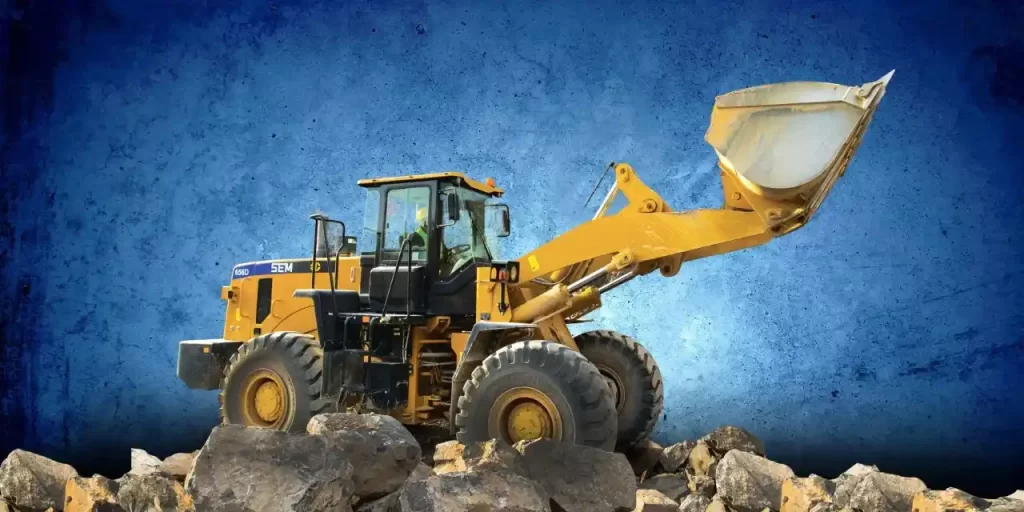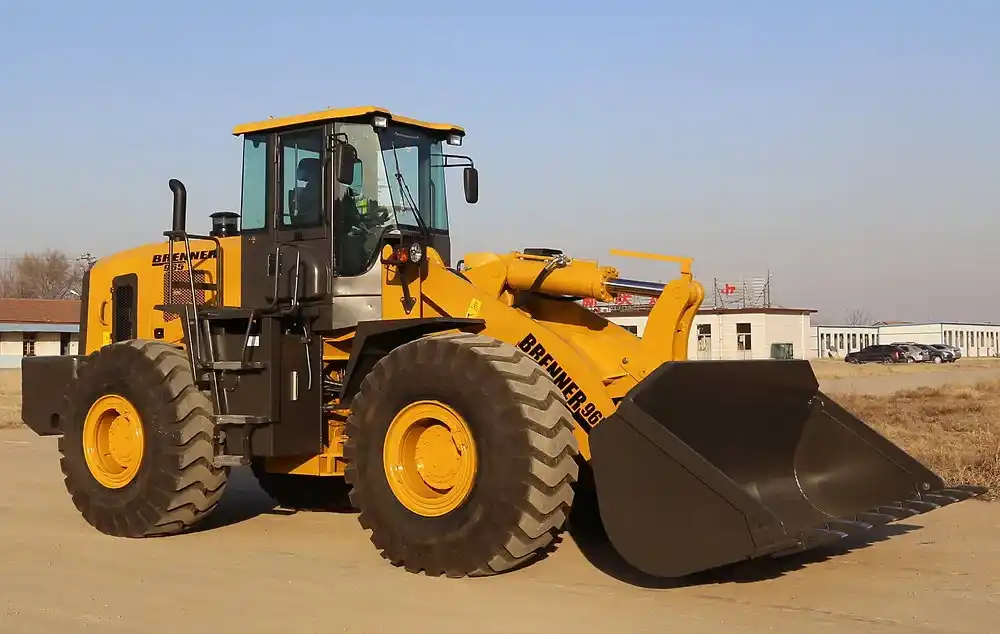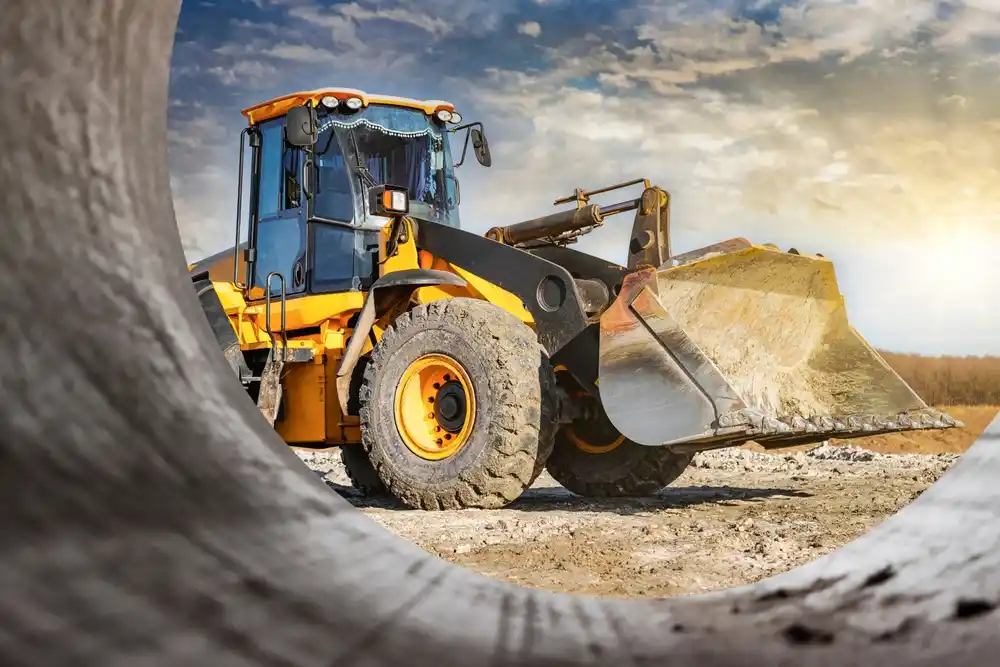Wheel Loader: Functions, Types, and Applications in Construction and Mining Industries
What is a Wheel Loader?
A wheel loader is a heavy machine equipped with rubber tires and is used to transport loose materials like dirt, gravel, sand, and debris. The large bucket in front is designed to scoop and move materials from one place to another. Wheel loaders are frequently used in construction, mining, excavation, and waste management projects due to their speed and efficiency.
Unlike track-based equipment, wheel loaders offer better mobility on hard, flat surfaces like paved roads or industrial areas. With their fast performance and high lifting capacity, wheel loaders are an essential tool in industries requiring the movement of large volumes of material quickly.
This article will delve into the functions, types, applications, and maintenance of wheel loaders in modern industries.

Main Functions of a Wheel Loader
A wheel loader is an extremely versatile piece of equipment, with various functions across different industries. Its main functions include:
Transporting and Moving Materials
The primary function of a wheel loader is to transport loose materials such as sand, gravel, soil, rocks, and construction debris. Its large front bucket allows it to scoop up substantial amounts of material and move them to the desired location, such as loading trucks or storage areas.Excavating and Leveling
Besides transporting materials, wheel loaders are often used for leveling surfaces in construction projects. Excavation and grading work prepare land before construction begins.Loading Trucks or Containers
Wheel loaders are frequently used to load materials into dump trucks or containers, significantly speeding up the process compared to manual labor and improving job site efficiency.Road and Infrastructure Maintenance
In roadwork and infrastructure projects, wheel loaders are used for clearing roads of debris, removing snow, and transporting building materials.Waste Management and Recycling
In recycling facilities, wheel loaders help move waste material, sort recyclables, and keep the site clean. With their high lifting capacity, wheel loaders can quickly move heavy materials.
Types of Wheel Loaders
Wheel loaders come in various sizes and configurations, each designed to meet specific needs in different projects. Below are some of the most common types:
Compact Wheel Loader
A compact wheel loader is smaller and more maneuverable, making it ideal for projects with limited workspace, such as urban construction or small-scale excavation. Despite its smaller size, it still has significant capacity to move lightweight materials.Medium Wheel Loader
Medium-sized wheel loaders offer larger capacities and are used in medium to large-scale construction projects. They can handle a wide range of materials, from soil to rocks and debris, with high efficiency.Large Wheel Loader
Large wheel loaders are primarily used in heavy industries like mining and quarrying. These machines have incredibly high lifting capacities and are designed to move massive amounts of materials such as ore, coal, and large rocks. Their size and strength make them ideal for large-scale projects.Articulated Wheel Loader
This type of loader has a joint in the middle, allowing for greater flexibility and maneuverability, especially in areas with limited access. Articulated wheel loaders are commonly used in construction and forestry.

Applications of Wheel Loaders in Various Industries
Wheel loaders are incredibly versatile, with wide-ranging applications across various industries. The key sectors that rely on wheel loaders include:
Construction
In the construction industry, wheel loaders are used for excavation, grading, and material transport. They are essential for preparing land, leveling surfaces, and loading trucks with construction materials. Urban construction projects often use compact wheel loaders for their maneuverability in tight spaces.Mining
In the mining industry, wheel loaders play a vital role in moving raw materials such as coal, iron ore, and quarry stones. Large wheel loaders are used to move massive amounts of material, improving efficiency in open-pit mining operations.Forestry and Logging
Wheel loaders are also utilized in the forestry industry to move logs, load timber onto trucks, and transport materials to storage or processing areas. Articulated wheel loaders are often preferred due to their ability to navigate tight spaces with ease.Recycling Industry
Wheel loaders are commonly used in recycling facilities to move waste materials and recyclables efficiently. They handle a wide variety of waste and help speed up the sorting process.Agriculture
In agriculture, wheel loaders are used to move harvested crops, fertilizers, and other agricultural materials. They help increase efficiency by reducing the time needed for manual transport.
Advantages of Wheel Loaders
Wheel loaders offer numerous advantages that make them a preferred choice for many projects:
High Mobility
With large, durable wheels, wheel loaders can move quickly over hard surfaces, including paved roads and compacted areas. This makes wheel loaders more versatile than tracked machines.Efficient Lifting Capacity
The large bucket in front allows wheel loaders to lift substantial amounts of material in one scoop, speeding up the material handling process and increasing overall productivity.Maneuverability
Certain types of wheel loaders, especially articulated ones, have excellent maneuverability, which is crucial for projects in tight or restricted spaces.Lower Operating Costs
Compared to track loaders, wheel loaders have lower operating costs because they don’t require track maintenance, and their tires last longer on hard surfaces.
Maintenance and Care of Wheel Loaders
To keep wheel loaders in top working condition and ensure a long service life, regular maintenance is essential. Key components that require attention include:
Hydraulic System
The hydraulic system is the heart of a wheel loader’s operation. Regular inspections and maintenance of hydraulic pressure, leaks, and pump performance are critical to maintaining operational efficiency.Tires
Tires should be checked frequently to ensure there are no damages or excessive wear. Damaged tires can affect the overall performance of the machine and increase the risk of accidents on-site.Engine and Cooling System
The engine is the powerhouse of the wheel loader, and routine maintenance like oil changes, filter checks, and cooling system inspections are crucial for keeping the machine in optimal condition.Electronic Components
With the increasing use of technology in modern wheel loaders, electronic components like sensors, control screens, and automation systems also require periodic inspection and maintenance.
SSC Works: Your Expert in Wheel Loader Repairs and Maintenance
Wheel loaders are a crucial part of construction and mining operations, and keeping them in top condition is a priority. SSC Works specializes in the repair and maintenance of wheel loaders, including hydraulic systems, engines, and other essential components. We provide fast and reliable services to ensure that your equipment stays operational and efficient.
If you require maintenance or repairs for your wheel loader, contact SSC Works today. Our skilled technicians are ready to offer top-tier service and keep your heavy machinery in excellent working order.

